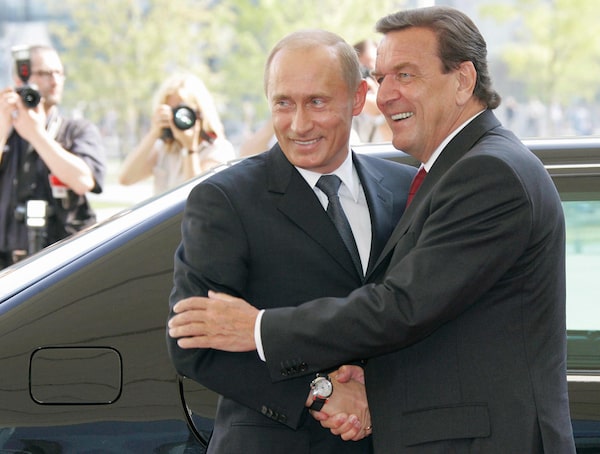
Gerhard Schroeder, right, then the chancellor of Germany, greets Russian President Vladimir Putin in September 2005 at the Chancellory in Berlin.VLADIMIR RODIONOV/Getty Images
The entire staff of Gerhard Schroeder, the former German chancellor who is close to Russian President Vladimir Putin and an advocate of increasing Russian natural gas exports to Germany, has resigned in protest over his ties to the Kremlin.
The employees quit because they were embarrassed by Mr. Schroeder’s prominent roles at three Russian gas and pipeline companies, according to German media reports.
Those roles had enraged many Germans even before Russia invaded Ukraine last week. Some of his critics noted that Mr. Schroeder’s income ultimately comes from a regime that has launched an illegal and senseless war.
Mr. Schroeder, 77, was chancellor until 2005, when he lost the election to Angela Merkel. He could not be reached for comment. Nor could Albrecht Funk, who served as Mr. Schroeder’s chief staffer at his Hannover office.
Mr. Schroeder had agreed to an interview with The Globe and Mail early last week, but Mr. Funk cancelled it, saying, “I don’t see any possibility of realizing the interview in the near future.” He gave no explanation.
The German news site Pioneer reported Tuesday that Mr. Funk and his office colleagues – four in total – decided to quit last week after Mr. Schroeder declined to follow his advice and sever his Russian corporate connections. All of Mr. Schroeder’s Russian corporate roles were thought to have been personally endorsed by Mr. Putin, who is known to be one of his best friends.
Mr. Schroeder is the chairman of Rosneft, the state-controlled oil giant. He is also the chairman of the shareholders’ committee of Nord Stream AG, the Russian company that built and financed Nord Stream 1 and Nord Stream 2, the twin pipelines designed to carry an enormous amount of gas from Russia to northeastern Germany, bypassing the pipeline network in Ukraine that feeds into Europe.
Nord Stream AG is 51-per-cent owned by an affiliate of Kremlin-controlled Gazprom, the world’s biggest stock exchange-listed gas company. Gazprom holds a monopoly on Russian gas exports, and Germany is its biggest client.
Mr. Schroeder was nominated to the board of Gazprom last month, a position he is due to assume in June. Whether he will still join the board is not known.
He was taking criticism from high-profile German and Ukrainian officials well before the invasion of Ukraine started.
Former Ukrainian foreign affairs minister Pavlo Klimkin told the Germany daily Bild that Mr. Schroeder was “the most important Putin lobbyist in the world.”
Mr. Schroeder made it clear as far back as 2004, when he was still chancellor, that he was a fan of Russian gas in general and Mr. Putin in particular. That year, he called Mr. Putin a “flawless democrat.”
Mr. Klimkin suggested that sanctions be placed on the former chancellor. “It’s important that there are sanctions not only against Russian government officials and Russian state-owned companies, but also against those who are pushing Putin’s projects abroad,” he said.
German politicians, even from Mr. Schroeder’s own Social Democratic Party (SPD), piled criticism on him, too.
Last week, SPD co-chairwoman Saskia Esken said “Rosneft and Gazprom are now the infrastructure of a bloody war of aggression. With his mandates there, Gerhard Schroeder is damaging the reputation of Germany and social democracy. Dealings with a warmonger are incompatible with the role of a former chancellor.”
Doing business with Russian companies is proving to be overly embarrassing for some Western companies, if not for Mr. Schroeder himself.
On Monday BP, the former British Petroleum, announced it would unload its 19.75-per-cent stake in Rosneft, which it has held since 2013. BP said it did so because of Russia’s “act of aggression in Ukraine.”
A day later, Shell said it would exit all its Russian operations, including the enormous Sakhalin 2 liquefied natural gas plant, in which it holds a 27.5-per-cent stake. Gazprom owns 50 per cent.
Last week, Olaf Scholz, the new German Chancellor, cancelled the certification process for Nord Stream 2 – the pipeline championed by Mr. Schroeder. The US$11-billion project has been built but has yet to deliver any gas. Its certification in the next few years is considered highly unlikely – perhaps impossible. Still, more than half of Germany’s imported gas comes from Russia, a level that various politicians now vow to reduce quickly because of the war in Ukraine.
Our Morning Update and Evening Update newsletters are written by Globe editors, giving you a concise summary of the day’s most important headlines. Sign up today.
 Eric Reguly
Eric Reguly